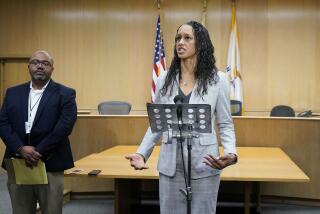Judge Rejects Jury’s Award in Firing Case
- Share via
Twice in 90 minutes Monday, a jury tried to award Ruth Thomas $500,000 for being fired unfairly by the Alpha Beta grocery chain.
Both times a judge rejected the verdict and sent the jurors back to reconsider their decision.
Thomas, 63, of San Clemente, wept each time the verdict was announced, then appeared stunned after Orange County Superior Court Judge Richard J. Beacom refused to accept it.
“The jury is saying I was not treated fairly,” said Thomas, who was left in legal limbo Monday in her quest for vindication until jurors return Tuesday morning. “But you have to wait till it’s in your bank account before you win anything.”
Lawyers for Thomas criticized Beacom, and Alpha Beta’s attorney praised him. But Beacom declined comment until conclusion of the case.
Decision Called Inconsistent
Beacom would say only that the jury’s decision to award damages was inconsistent with its finding on liability.
Thomas’ wrongful termination lawsuit is one of a wave that has been filed since California courts, in a series of cases beginning in 1980, liberalized the rights of non-union employees.
Thomas claimed that fellow executives at the 200-store chain used corporate reorganization as a pretext to forcibly end her 25-year career.
She was named corporate secretary in 1975 and was elected one of 19 vice presidents in 1980 with a salary of $70,000 a year.
But within three years, despite what her attorneys said was a spotless work record, most of her job duties had been given to other employes. The only task that remained then was transferred from La Habra headquarters to Utah, and Thomas was offered a low level supervisory job at half her original salary.
“There was not one criticism of this woman’s performance,” said James P. Stoneman, one of Thomas’ lawyers. “That’s what makes it such an unbelievable thing, after 25 years to be squeezed out the way she was.”
Thomas got the “empty desk treatment,” and it was both unfair and malicious, John P. McCarthy, another of her attorneys, argued.
One week after executives threw a formal banquet for one of her colleagues on his 25th anniversary, Thomas completed her 25th year with Alpha Beta. She found a gold watch and a pin in an Alpha Beta paper sack on her desk--the sole recognition Thomas received, McCarthy said.
Thomas’ troubles began when Alpha Beta, with 200 stores, was bought by American Stores Inc. of Salt Lake City in 1980. The new corporate owners decided to combine some management functions of the grocery chain and its four other retail operations.
2 Claims Rejected
The restructuring occurred at a time when Thomas was the oldest as well as the only female vice president. In both of the verdicts it attempted to return Monday, the jury rejected Thomas’ age and sex discrimination claims.
A series of past and present Alpha Beta executives testified that Thomas was given advance notice that her job would disappear in the reorganization, that she was kept on the payroll for nine months after she stopped working and was offered another job, which she refused. Attorneys for the firm also contended during the trial that Thomas falsely claimed to have a college degree.
In brief remarks from the bench Monday, Beacom indicated that both verdicts the jury attempted to return were legally inconsistent.
In the first verdict, returned about 2:30 p.m., jurors formally found the firm had not wronged Thomas but concluded that her termination had been malicious. The jury said it wanted to award her $500,000 as punitive damages against Alpha Beta, two former presidents and another executive.
The second attempt at a verdict came about 4 p.m., with the jury concluding, by a 9 to 3 vote, that the firm had failed to act in good faith and deal fairly with Thomas. The jury again wanted to fix punitive damages at $500,000.
In neither case did jurors conclude that the firm had breached its employment contract with Thomas. Beacom told jurors he would not accept a verdict that included punitive damages unless jurors found the employment contract had been breached.
A Second Trial
This is the second trial of Thomas’ lawsuit. Last year, a jury could not agree on her claim, resulting in a rare mistrial in a non-criminal jury case. With the agreement of 9 of 12 jurors needed for a verdict, the jury split 8 to 4 in Thomas’ favor.
Thomas was a different person after she left Alpha Beta, according to both her husband, Gerald, and daughter, Edith Hugo.
“She had trouble with concentration,” Stoneman said. “She was depressed. She cried a lot. She didn’t want to see her friends. She didn’t want to get up in the morning.
“Before, she was highly motivated; she was always up early, eager to get on with the day’s work.”
Her husband, now retired, testified that Thomas “just didn’t have the old get up and go.”
More to Read
Sign up for Essential California
The most important California stories and recommendations in your inbox every morning.
You may occasionally receive promotional content from the Los Angeles Times.













